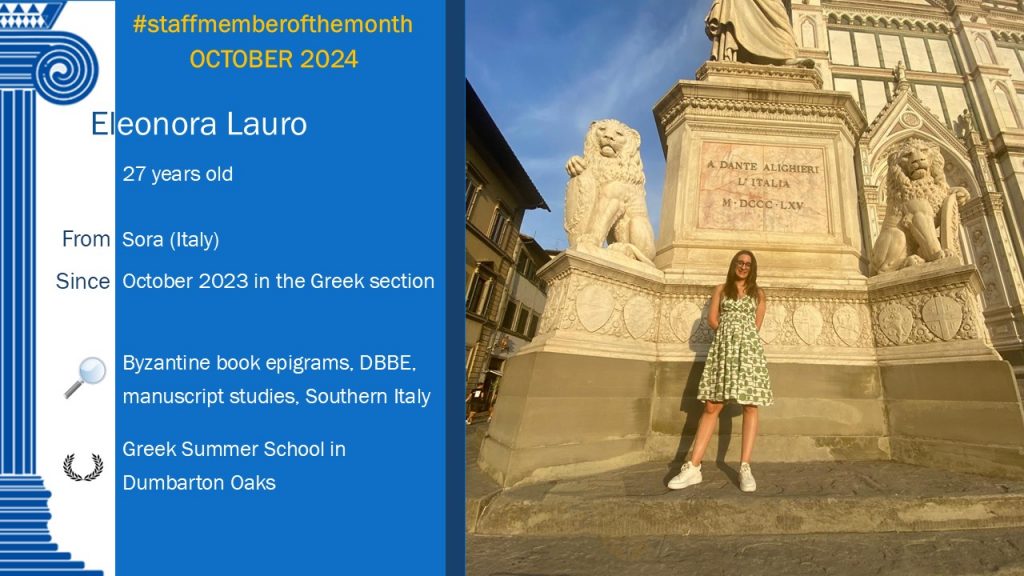The staff member of this month is Eleonora Lauro who started her PhD with us in October 2023 after completing her BA and MA at the Università degli Studi di Roma Tor Vergata. Nina Vanhoutte asked her about her research, hobbies and her first year in Ghent.

Hi Eleonora! You started a PhD in our Section last year, on the DBBE-project, do you want to tell us a bit more about your research?
Hi! I would love to share more about my research. Within the “DBBE” framework, I am currently working on the “book culture subproject”, which aims to explore the socio-cultural entanglement of book epigrams. These metrical paratexts offer interesting insights into the interaction between scribes/readers/patrons and the manuscripts themselves. Specifically, my research focuses on manuscripts produced in medieval Southern Italy. The goal is to highlight how individuals and communities in this region used book epigrams to express their relationship with the main texts. Of course, the database and its technologies have been incredibly helpful, giving me quick access to a wide range of data and metadata.
Can you tell me about your experience at the Greek Summer School in Dumbarton Oaks? What were some highlights or key takeaways from that time?
My one-month stay at Dumbarton Oaks for the “Greek Summer School” was an intense but wonderful experience. The program included group translation sessions, palaeography exercises and individual tutorials, so we were on a tight schedule, but every moment was worthwhile. I learnt a lot, especially thanks to the instructors – Prof. Stratis Papaioannou and Prof. Alexandros Alexakis –, who were always willing to help and guide us through the material. My companions during this adventure – the other participants – were definitely one of the highlights of my time at Dumbarton Oaks! We exchanged stories and advice about our respective PhD journeys, and we genuinely enjoyed spending time together. Our outing to see the fireworks for the Fourth of July is one of my favorite memories. Visiting the Library of Congress was also a dream come true for me!
My research focuses on manuscripts produced in medieval Southern Italy. The goal is to highlight how individuals and communities in this region used book epigrams to express their relationship with the main texts.
You’ve lived in Ghent for about a year now, what are your favourite things about living here?
It’s been a wonderful year living in Ghent! It’s a beautiful city, and I really love how its rich history and lively modern culture blend together. There are always interesting activities and initiatives to take part in. For example, the Film Fest Gent, which has been going on for the past two weeks, is an amazing event that has brought me back to the cinema after a long time!
I heard you make a great Pasta Amatriciana – is cooking your main hobby outside of work? Or how do you spend your downtime?
Who has been spreading this false rumour? Clearly, they have never had a properly cooked Amatriciana! Jokes aside, I do my best in the kitchen, but it’s not really my realm! Cooking is more a necessity than a fun activity for me. When I have some downtime (and the weather allows it), I like to go to the Groenevalleipark, which is very close to where I live. I enjoy walking around the park or sitting on a bench there to catch up on some reading. I have also recently rediscovered my love for movies, so I have been going to the cinema more often lately. As you can tell, I enjoy the simple life!
I enjoy walking around the park or sitting on a bench to catch up on some reading. I have also recently rediscovered my love for movies, so I have been going to the cinema more often lately. As you can tell, I enjoy the simple life!
What are you most looking forward to in the upcoming years?
I look forward to making significant progress with my research and sharing my results through publications and conferences. I also hope that the next years will bring exciting opportunities to engage with international peers, deepen my expertise in the field of Byzantine studies, and enhance interdisciplinary collaboration. Overall, I see these next few years as a chance for both personal and professional growth – and hopefully, a culinary breakthrough as well!
“Goede vooruitzichten”, as we would say in Dutch! And if you do become a master chef, please let us have a taste!